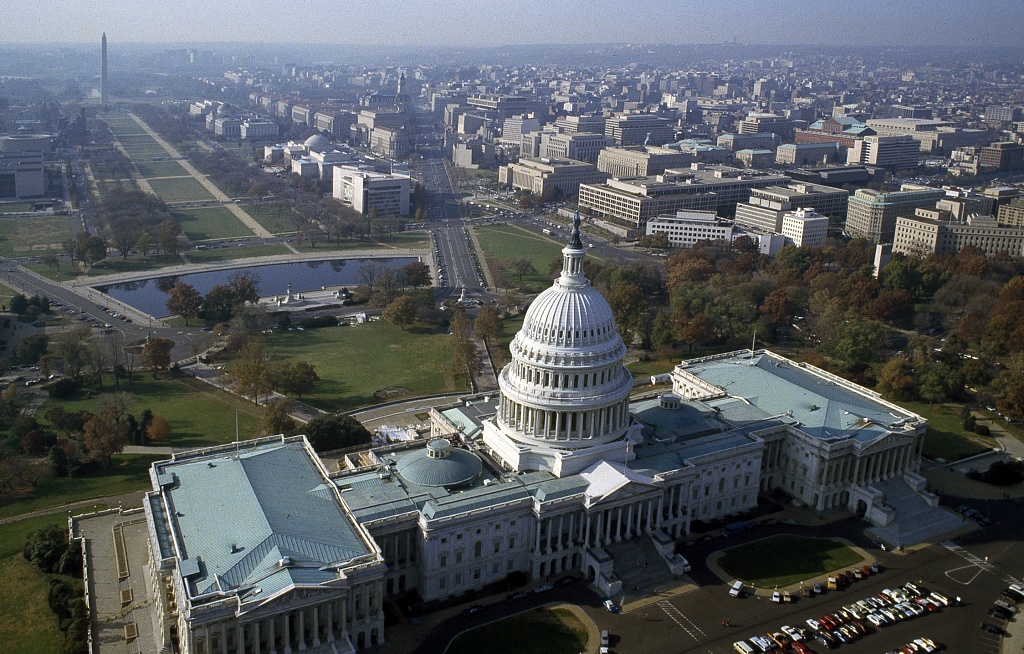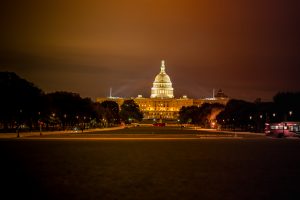Update: The original version of this story listed the Senate bill as having 42 co-sponsors. At the time of publication, this number was actually 44.
Passing along strict party lines, legislation to admit D.C. as the nation’s 51st state was approved by the House of Representatives on April 22. It marks the second consecutive year that the chamber passed such a bill, a signal that the statehood question has risen in the Democratic Party’s shortlist of priorities.
Since taking control in January of this year, Democratic leaders in Congress have framed D.C. statehood as part of a broader push to promote voting rights and racial equity. The District’s over 700,000 residents, 46 percent of whom are Black, are not represented by voting members in either the House or the Senate. This arrangement becomes particularly awkward considering D.C. residents pay more federal income taxes on average than residents of any state—a fact their “taxation without representation” branded license plates are quick to point out. While changing D.C.’s status poses a political threat to some—namely Republicans, who would prefer not to add a new blue state to the map—residents and local officials emphasize fairness above partisan interest.
“The fight for D.C. statehood is truly a fight for civil rights, it’s a fight for equity, it’s a fight for equality, and it’s a fight for justice,” Jamal Holtz, a 22-year-old D.C. native and statehood advocate, said in an interview with the Voice. “It’s the most pressing civil rights fight of our lifetime. This fight for me is personal. When I think about all of the issues that are happening on the Hill, the things that affect my community and American families across the country, to not have a voice or a vote on those things—it’s personal.”
Holtz is a lead organizer of 51 for 51, an advocacy group trying to pass a D.C. statehood bill using only 51 votes in the Senate. That detail is key, because under current parliamentary rules, a bill granting statehood would require 60 senators’ votes in order to pass—otherwise, it could be blocked indefinitely in what’s known as a filibuster. Given Democrats’ razor-thin 50-vote majority in the chamber, and that it is exceedingly unlikely for 10 GOP senators to cross the aisle in statehood’s favor, proponents like Holtz say lowering the required vote threshold is the only path forward.
“The filibuster is a Jim Crow relic that consistently blocks civil rights legislation. We’ve seen it in our country’s history—it attempted to block the 1964 Civil Rights Act, it attempted to block over 200 anti-lynching bills in our nation’s history,” Holtz said. “If 51 votes is good enough for Sen. McConnell to appoint three Supreme Court justices, it should be good enough—and it is good enough—to enfranchise the more than 700,000 residents of Washington, D.C.”
Such a rule change might just be in the cards. With the exception of a few key Democratic holdouts, reforming Senate rules to expand voting rights has grown increasingly popular among the majority’s caucus. On top of that the Senate bill on statehood has 44 co-sponsors, the most such legislation has ever received. Time, however, is ticking: With the Biden administration’s infrastructure plan taking priority, and not all Democratic senators on board, D.C. statehood remains an open question.
How statehood would change D.C.
Despite the hurdles standing before it, D.C. statehood is overwhelmingly popular with residents—in a 2016 referendum, 86 percent of voters favored the change. That’s because a lack of statehood has most often translated to a lack of local control over the District’s government. Though residents first started electing a mayor and local legislature in the 1970s after Congress passed the D.C. Home Rule Act, that government’s autonomy remains limited in a few key ways.
First, all laws passed by the D.C. Council are subject to congressional approval. If it chooses, the national legislature may block local acts from taking effect. This has happened multiple times since the local government was chartered, usually in cases where conservative congressional majorities disagreed with local ordinances.
In 1996, for instance, the D.C. Council passed a law authorizing the city to fund needle exchange programs in order to fight the spread of HIV. Two years later, Congress blocked that funding, effectively stamping out the measure until it rescinded that veto in 2007. Consequently, D.C. residents have suffered much higher rates of HIV compared to the nation overall—especially for Black communities where positivity rates remain disproportionately high.
Similar stories of legislative incongruence between Congress and the D.C. Council are common. In 1992, D.C. passed a law allowing same-sex couples to form domestic partnerships and access health care benefits, only for congressional Republicans to block the measure until 2002. The District legalized medical marijuana in 1998, but Congress banned it until 2009. Currently, a federal budget measure prevents D.C. from taxing marijuana sales, despite the fact that recreational weed has been legal in the District since 2014.
Apart from legislation, D.C.’s lack of statehood also complicates how security forces operate within the District. Though residents elect a mayor, currently Muriel Bowser, the president is still the commander-in-chief of the D.C. National Guard—meaning the Pentagon is required to sign off on any emergency deployments. This sparked multiple controversies in recent memory, including President Trump’s use of federalized troops to quash racial justice protests on June 1, 2020, as well as the more recent Jan. 6 attack on the Capitol. On the day of the insurrection, Bowser’s request for troops was initially denied by the Pentagon, slowing security forces’ ability to respond and leaving D.C. momentarily dependent on guardsmen sent from surrounding states.
“We were left out of the Senate impeachment trial about the events that happened in our home,” Holtz said. “D.C. residents that day lost wages, health care, and access to parts of the city because of the insurrection. Grocery stores were forced to close early. Public transportation was forced to close early. That in essence affected D.C. residents at their core, because we didn’t have a vote in our Congress.”
What statehood means for racial justice
While statehood would end the city’s unique federal oversight, it would also represent something else: victory in a fight for Black representation that has lasted for over two centuries.
Since D.C. was officially organized by an act of Congress in 1801, the national legislature has always controlled the territory, either through appointed governors or unlimited veto power. At the same time, it’s only ever been represented in Congress by delegates who are unable to vote.
Del. Eleanor Holmes Norton, D.C.’s current non-voting delegate, described the fight for statehood as being parallel to her own family’s history.
“For me, this is deeply personal,” Norton said during floor debate over the bill. “My own family has lived in D.C. since my great-grandfather Richard Holmes, as a slave, walked away from a plantation in Virginia and made his way to D.C. almost 200 years ago. Richard Holmes made it as far as D.C., a walk to freedom but not to equal citizenship so far for our family.”
That inequality, however, also exists beyond the chambers of Congress. The nation’s capital remains one of the most segregated cities in the United States, and holds the single largest racial wealth gap of any state. Gentrification in D.C. has pushed many of the Washington’s Black and immigrant residents out of their neighborhoods and homes.
According to Holtz, Congress’ resistance to granting Washingtonians full voting representation is rooted in racism against the city’s majority non-white electorate.
“At its core D.C. statehood is a racial justice issue. The majority of D.C. residents are Black and Brown, and ignoring their voices in Congress is pure racism. If D.C. were to become a state, it would be the only state with a plurality of Black residents,” Holtz said. “We have an opportunity to ensure that this generation is the last generation to be denied full voting rights.”
All of that is why H.R. 51, the statehood bill passed by the House, also included a name change. Rather than remain the District of Columbia, the 51st state would instead be called the Douglass Commonwealth, after the abolitionist and D.C. resident Frederick Douglass. The D.C. would still remain, only now to honor the legacy of Black reformers.
Norton, in a statement just before the bill passed, reflected on the long march toward statehood—and the final stretch still ahead. “Congress has a choice. It can continue to exclude D.C. residents from the democratic process, forcing them to watch from the sidelines as Congress votes on federal and D.C. laws, and to treat them, in the words of Frederick Douglass, as ‘aliens, not citizens, but subjects.’ Or it can live up to our nation’s founding principles, join the 54 percent of Americans—and growing—who support D.C. statehood and pass H.R. 51.”





